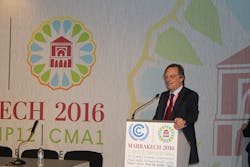Public Transport More Visible Than Ever at COP22 Climate Talks
The COP22 climate talks in Marrakesh have focused on implementation and UITP (the International Association of Public Transport), has announced that public transport is gaining increasing recognition as an indispensable tool to help countries' increase their efforts to reduce emissions.
UITP was actively involved in the transport action days, which showcased key initiatives that countries can implement to meet their climate objectives agreed upon at COP21 in Paris. UITP’s message at the COP was simple: public transport is essential to reach the Paris Agreement’s goals and without a greater shift to sustainable mobility, reaching these goals will be increasingly unlikely.
Public transport is increasingly gaining a reputation for implementation. UITP’s Declaration on Climate Leadership was recognized as one of 12 transport initiatives in the UN’s Global Climate Action Agenda, which will help provide inspiration for action countries to meet their carbon-cutting commitments. The Declaration includes over 350 pledges – 45% of which have already been implemented in 60 cities - from the public transport sector to increase carbon-cutting measures and encourage a shift from private cars to public transport. The Declaration was also recognized by the UNEP Climate Initiatives Platform as a success story.
The Declaration supports the sector objective to double the modal share of public transport globally by 2025. If this objective is achieved, per capita urban transport emissions would be reduced by 25%, a saving of half a billion tonnes of CO².
“It’s clear that the current modal share of public transport in many cities around the world is not sufficient to meet the Paris Agreement targets,” said UITP Secretary General, Alain Flausch. “Decarbonisation efforts in the transport sector therefore must go beyond technical actions and focus on long-term systemic shifts that will lock us into a low carbon pathway, making it easier to decarbonise the sector. This is where public transport is playing - and will continue to play - a vital role”.
